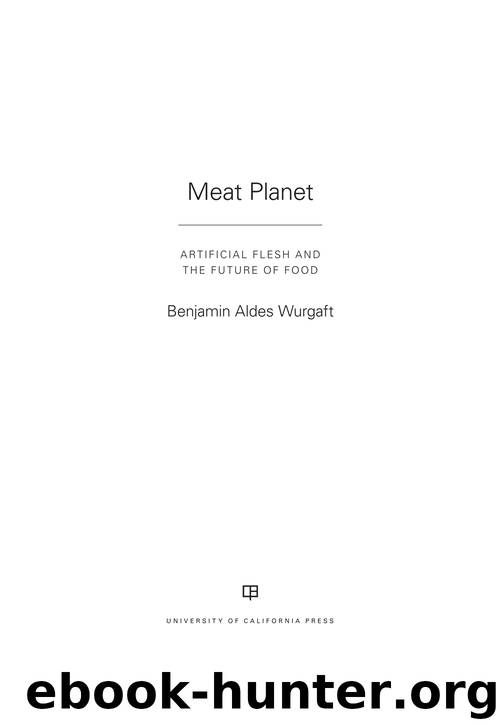Meat Planet by Benjamin Aldes Wurgaft

Author:Benjamin Aldes Wurgaft
Language: eng
Format: epub
ISBN: 9780520295537
Publisher: University of California Press
Myself and Pangur, my white cat,
have much the same calling, in that
much as Pangur goes after mice
I go hunting for the precise
word. [. . .]14
But to hunt for a word is not exactly like hunting for a mouse, and this is the tension upon which Muldoon’s poem relies. The precise word is tied to other words and to a sense of expressive purpose that extends in time beyond the cat’s killing a mouse and, perhaps, presenting it to a human companion. Just as poet and cat are alike but distinct, the quality of project-ness distinguishes my experience of wanting to live from a lobster’s similar desire. This says nothing about the comparative validity of our respective wants, but it says much about their different characters.15 However, it doesn’t settle our moral problems concerning the treatment of animals to say that living with them raises important questions about human distinctiveness, unless we go so far as to brandish our distinctiveness as an argument for killing and eating animals. That is, unless we embrace anthropocentrism wholesale and decide that being human, and gratifying what appetites arise within us, licenses the cruel treatment of nonhumans.
At the core of Singer’s Animal Liberation is the aforementioned problem of animal suffering. Singer’s goal was always “expanding the moral circle” that surrounds those beings we deem worthy of moral consideration.16 Singer did not claim that animal lives have the same value as human ones, but he also never staked a claim for the moral superiority of humans or the moral priority of their needs. Nor did Singer argue that either animal or human lives have a kind of intrinsic value, but rather that our (in the sense of “we beings”) happiness or suffering is what makes us worthy of moral consideration. The validity of our aggregated present and potential future experiential states is what requires us to make difficult moral choices such as whether or not to raise animals for food.
Animal Liberation is less a book of philosophy than an activist’s book that begins from a philosophical point of view. Its ratio of paragraphs of philosophical argument to paragraphs of detailed accounts of cruelty to animals in our food and medical research systems recalls the very dry martini: a vanishingly small amount of vermouth and a much larger quantity of gin. This is not philosophically invalidating (though some philosophers will object to my equation of philosophy with vermouth rather than gin). Arguments need not be long to be powerful. Singer wants to overcome a prejudice he terms “speciesism,” or the belief that human concerns simply outrank those of other animals to the point where the suffering of other animals does not count. One of the most spectacular displays of speciesism in philosophy can be found, as Korsgaard points out, in Immanuel Kant’s meditations on the origins of humanity, in which he considers the distinction between humans and other animals:
Download
This site does not store any files on its server. We only index and link to content provided by other sites. Please contact the content providers to delete copyright contents if any and email us, we'll remove relevant links or contents immediately.
Craft Beer for the Homebrewer by Michael Agnew(18238)
Marijuana Grower's Handbook by Ed Rosenthal(3678)
Barkskins by Annie Proulx(3368)
Project Animal Farm: An Accidental Journey into the Secret World of Farming and the Truth About Our Food by Sonia Faruqi(3219)
Red Famine: Stalin's War on Ukraine by Anne Applebaum(2930)
The Plant Messiah by Carlos Magdalena(2927)
0041152001443424520 .pdf by Unknown(2844)
Organic Mushroom Farming and Mycoremediation by Tradd Cotter(2689)
In the Woods by Tana French(2591)
Beer is proof God loves us by Charles W. Bamforth(2456)
7-14 Days by Noah Waters(2412)
Between Two Fires by Christopher Buehlman(2325)
Borders by unknow(2306)
Reservoir 13 by Jon McGregor(2300)
Meathooked by Marta Zaraska(2257)
The Art of Making Gelato by Morgan Morano(2254)
Birds, Beasts and Relatives by Gerald Durrell(2219)
The 7 Habits of Highly Effective People: Powerful Lessons in Personal Change (25th Anniversary Edition) by Covey Stephen R(2197)
The Lean Farm Guide to Growing Vegetables: More In-Depth Lean Techniques for Efficient Organic Production by Ben Hartman(2135)
